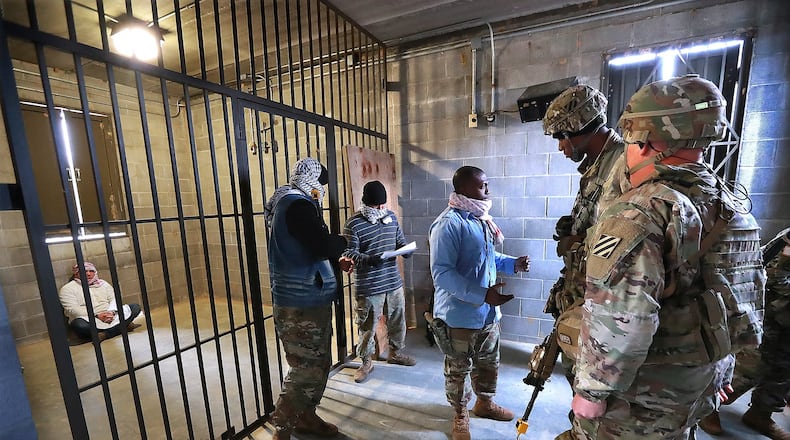Several Georgia National Guardsmen this week filed into a cinderblock building here meant to resemble an Afghan police station. They pretended to be searching for a fugitive insurgent. The local “police chief” — played by an actor in a light blue shirt — led the troops upstairs to a man crouched in a small cell. And then the chief handed the troops some documents about enemy activity in the area.
Grateful, Sgt. Clayton Peck of Oconee County responded by giving him a Slim Jim beef stick. The chief and his officers were elated. But the cheeriness disappeared moments later when the troops stepped outside the station and came under small arms fire — all blanks — from “insurgents.”
“Contact!” one of Peck’s troops yelled. “Eleven o’clock!”
Peck is among more than 2,000 48th Brigade troops from across Georgia receiving special training here ahead of their nine-month deployment to Afghanistan, where they will train Afghan troops and police. On Friday, the Guardsmen completed two weeks of separate training — called “Guardian Angel” — aimed at countering insider attacks from insurgents infiltrating the Afghan military.
The rest of the brigade’s training is scheduled to end Thursday. The following day, the troops will attend a send-off ceremony at Fort Stewart and then return to their families for a short holiday break before the deployment in January.
Back outside the pretend Afghan police station, Peck and his fellow Guardsmen scrambled for cover amid the ambush, returning fire (all blanks). Then a loud explosion from a fake improvised explosive device rocked the makeshift village. One of the Georgians pretended to be gravely injured from the blast. A medic rushed to treat him as Peck radioed for a medical evacuation.
A pair of U.S. Special Forces troops closely observed Peck and his men go through the exercise. Later, they offered some helpful pointers, including not offering pork Slim Jims to the Muslims they encounter in Afghanistan.
“This is actually one of the best (training) lanes we have run,” Peck said. “It was very eye-opening for some of the things that we need to work on in the coming weeks as a newer squad.”
In-depth: Georgia guardsmen to face crowded, complex battlefield in Afghanistan
The brigade also practiced air assault missions with helicopters this week and improved marksmanship at the rifle range ahead of deployment. And it got to bring out its big guns . On Wednesday, troops from the 1st Battalion of the 118th Field Artillery Regiment test fired their howitzers in a remote part of the base. It is a highly choreographed process involving several troops per gun carrying out a series of responsibilities, including aiming, loading and firing.
Lt. Col. Rodney Tatum Jr., the battalion’s commander, said the training at Fort Stewart has been rigorous.
“Most of us,” he said, “are like, ‘Let’s get on the plane now. We are ready to go.’”
Insider attacks a focal point
The U.S. military would not permit The Atlanta Journal-Constitution to observe the brigade’s training aimed at thwarting insider attacks, citing security concerns. But troops who have participated said it involves realistic role-playing scenarios with attackers firing Simunition, or paintball rounds. The training — it is continually revised in response to what is happening overseas — emphasizes security, vigilance and marksmanship.
Several recent attacks have put these so called “green-on-blue” threats in the spotlight. Last month, Maj. Brent Taylor, a small-town mayor and National Guardsmen from Utah, was killed in such an attack during his fourth deployment to Afghanistan. And in October, a Taliban assassin infiltrated Afghan security forces, killed an Afghan general and a provincial intelligence chief and wounded an American brigadier general, while barely missing the top U.S. and NATO military commander in the country, Gen. Austin S. Miller.
Col. Matt Smith, the 48th Brigade’s commander, called the Guardian Angel sessions “the best training we have had here.”
“It was very sophisticated,” he said. “It really refined the individual skills of our soldiers.”
U.S. servicemembers, he said, can trigger insider attacks by offending someone’s culture. He expressed confidence in his Guardsmen, pointing out many have civilian careers – including in law enforcement — requiring them to routinely interact with people and to treat them with respect.
“That makes me a little bit more comfortable,” he said, “about the risk posed by insider attacks.”
About the Author
The Latest
Featured




